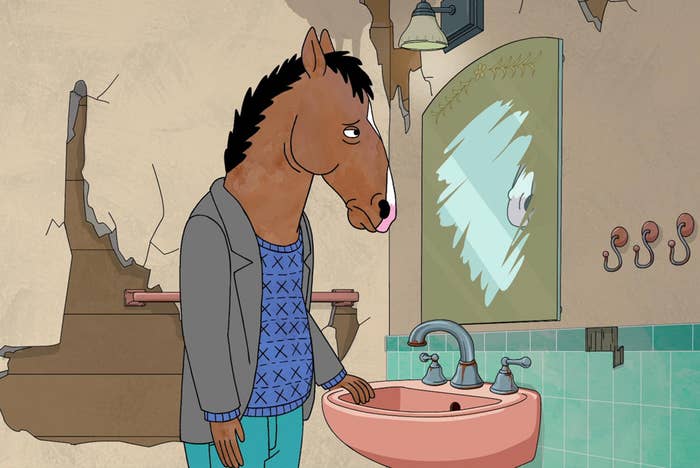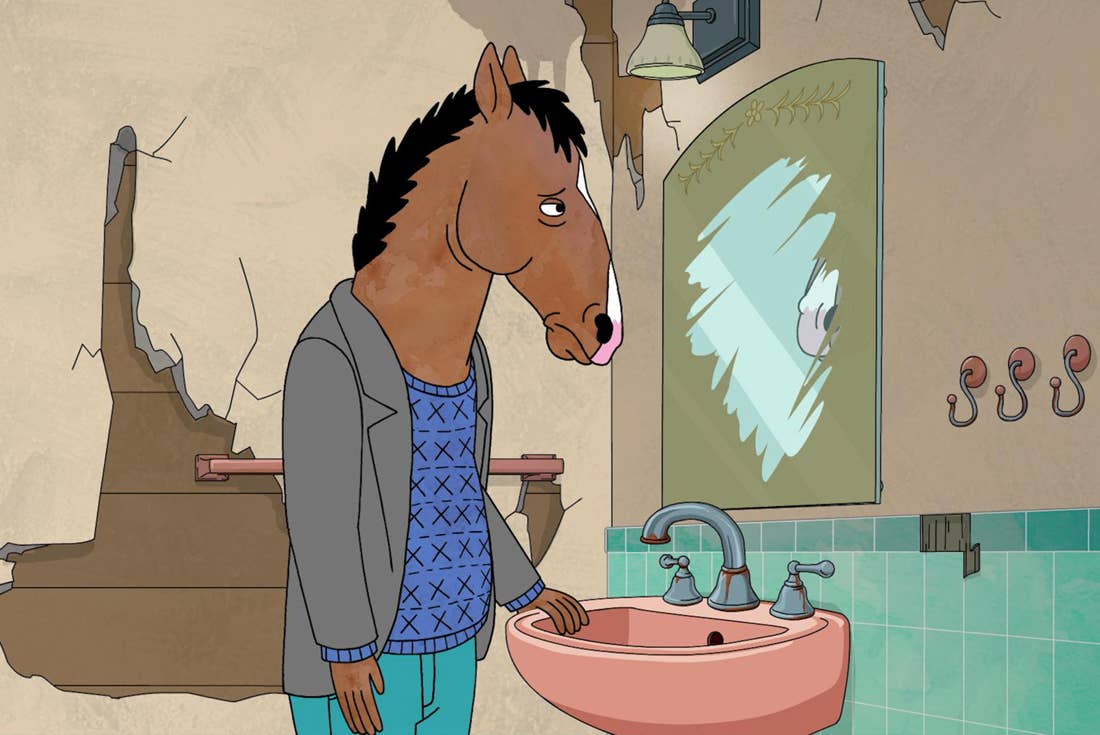
When trying to pitch BoJack Horseman to anyone who hasn’t seen it, I’ll invariably say something like: “It’s Will Arnett as a horse – a depressed, alcoholic, washed-up actor-horse… oh, and he sleeps with animals and humans, which is apparently fine.” I recite this line to creator and showrunner Raphael Bob-Waksberg, who laughs but is unfazed.
“When it’s described back to me, it sounds much weirder than how I’d pictured it. I never thought of it as being that much of a hard thing to swallow. I mean, look at cartoons! There are so many weird cartoons out there right now.”
Granted, weird cartoons aren’t new – they’re essentially Adult Swim’s bread and butter (see: Rick and Morty[also on Netflix], Aqua Teen Hunger Force, Superjail! and Frisky Dingo). The thing is, weird is normal on Adult Swim, being the zenith of alternative programming and all. But pitching BoJack Horseman to Netflix, whose other Originals at the time were House of Cards and Orange is the New Black, should have been a hard sell. Not according to Bob-Waksberg.
“I pitched out the whole first season – episodes one through to twelve – to Netflix: ‘We have a guy who’s very funny and goofy, and we’ll reveal this backstory where he’d betrayed his best friend and never got the closure he wanted on that. The end of the season will show him looking out over Griffith Park, where he’s gotten everything he thought he’d ever wanted, but in reality, he’s never felt more alone.’ I think Netflix really responded to this pitch: to the specificity of it, that it wasn’t quite like anything else, and that I was excited to do it well.”
Three years on, BoJack is a tour de force. Seasons two and three hold 100% approval ratings on Rotten Tomatoes, and ‘Fish out of Water’ was crowned as TIME’s best TV episode of 2016. Although season three was essentially one giant ‘fuck you’ to the Oscars and award ceremonies in general, it hasn’t stopped the show from winning a few statues of its own. Clearly, season four has some big horseshoes to fill.
“The pressure was on, but in a way I feel like I’ve surpassed it. With each season I’ve thought, ‘They’re going to hate this’. Then they liked and liked it even more. So, people might hate season four, but I’m okay with that. If you try to guess what people are gonna think, you’re chasing the wrong thing.
From my own experience in watching shows, there’s two ways that they become bad: they change and they’re not why you loved the show, or they don’t change and they repeat themselves too much… and those are the only things you can do! There aren’t a lot of ways to avoid them. I’m really trying not to worry about it. One thing I really embrace is making the show that I, the other writers, animators, directors and designers want to make. We are very proud of this season.”
Season four is slated for release on September 8 and will see a renaissance of all the show’s major characters. Particular arcs of interest established in season three’s finale (SPOILER ALERT): Diane becomes a writer for a feminist site, and will write an exposé on her husband Mr. Peanutbutter; the happy-go-lucky Todd comes out to Emily as being asexual (‘I think I might be nothing’); BoJack mourns Sarah Lynn’s overdose and blames himself. He recklessly speeds down an open road, eyes closed and hands-free. He snaps awake, and brakes suddenly upon seeing a pack of running wild horses. He realises he needs to start anew, perhaps go back to his roots. The universe hears him; a young horse is making calls to try and track him down, and all visual signs point to her being his daughter. As it turns out, ‘family’ is one of the main themes this season.
“We’re looking at what we do to our family, what we do to be in a family, as well as biological and created families. Another theme is the stories we tell, particularly the internal story: how we define ourselves to ourselves, and who we think we are versus who we want to be.”
As vague as this all sounds, it’s hard not to trust Bob-Waksberg, who’s helmed the show to exponential heights since its inception. His world is one of co-existing anthropomorphic animals and primal humans, pointed satire and grave introspection, overt wisecracks and underlying melancholia. This amalgam of opposites is what sets BoJack firmly apart from other tired critiques of Hollywood. In order to realise his vision without, or with very little artistic compromise, Bob-Waksberg needed to find the right network and benefactor.
“I think Netflix have a bit of a reputation for being totally hands-off, which is not quite fair. They are very active and vested, but in a really good way. A lot of times you’ll hear about network interference – where you’ll pitch a show to a network, and they buy it, but don’t really want you to make the show you pitched. What they really want is a show that’s like Modern Family. And now that they’ve bought your show, they’re gonna give you notes until you make it like Modern Family.
With Netflix, it felt like I pitched the show, and they were there to help me make that show. It’s very helpful to have a good network as a partner, because they are your first audience. Netflix gets involved in all of the conversations that we’ve been involved in. They’re big fans of the show, so they can tell us if something works, or if we need to trim things back.
Long before he was in charge of Netflix’s prize horse, Bob-Waksberg was honing his comedic storytelling skills at the aptly named Bard College. He and some friends formed Olde English, a comedy troupe that wrote and filmed over a hundred sketches and a full-length feature (many of which are available online).
“That was such a great comedy boot camp for me. They really taught me how to be in a room, how to collaborate with and listen to other people, and how to fight for my ideas and make them happen. They also gave me a lot of confidence as a comedy writer, and so when we made BoJack, I said, ‘Let’s focus on character and story and not worry so much about comedy, because I think we are all funny people and so the comedy will bubble up by itself’.”
Olde English alumni Caleb Bark, Adam Conover and David Segal have all voiced characters on the show, while Jesse Novak composes its soundtrack. Conover’s partner Lisa Hanawalt is the show’s head designer and illustrator. Bob-Waksberg was so inspired by the animal-people she drew that he decided to make a show about them.
Whimsical characters, animal puns and meta-references are just a few devices the show uses to prod away at some uncomfortable social issues. One of the main arcs of season three was Todd and Mr. Peanutbutter’s start-up: Cabracadabra, a female driver rideshare company. Originally setting out to provide a safe space to women, the company’s ethos took a nosedive when its owners decided that naturally, they should extend the safe space to men. It’s a fun and absurd satire of gender inequality, something that Bob-Waksberg is very vocal about.
In 2015, he wrote a lengthy Tumblr post on gender in comedy. He described a ‘tendency for comedy writers, and audiences… to view comedy characters as inherently male, unless there is something specifically female about them’. He is not immune; he has often pitched characters for Hanawalt to draw, to be taken aback when she draws them as women. He recognises that these gender biases are partly perpetuated by years of consuming media, and that one needs to actively work against it.
So two years on, has the entertainment industry made any progress?
“Short answer, no, I don’t think so. Long answer, yeeees, there has been very small progress. It’s hard for me as an American to look at the election of the last year, and through the thick of it all, see the way gender plays in our society. I try to be more conscious of it every day. I still slip up and make mistakes, but it’s something I’m aware of when I’m hiring people or listening to people in the room.
I do think that there are more people, certainly in Los Angeles, who are more aware that it is a problem, than say five years ago. Recently, the light has kind of shone on us and said, ‘We have a lot of arcs to do, we need to be better and be more active about promoting women and people of colour. We need to take these things seriously instead of assuming that the best are always going to rise to the top, because it’s not a fair autocracy’.”
To its credit, BoJack would pass the Bechdel test a million times over. Its two female leads, Diane Nguyen and Princess Carolyn, are driven, inquisitive, and often run rings around their male counterparts. And it’s always appreciated when film and TV do away with the hysterical damsel trope – here, it’s Princess Carolyn’s calm logic and buoyant optimism that will assuage BoJack’s neuroses.
When you’re one of the two most hyped adult animated shows around, people will inevitably compare you. Rick and Morty follows a mad-scientist and his grandson as they portal-gun their way into different dimensions. The tone and style of the shows are (literally) worlds apart, but fans have drawn other similarities, especially between their antagonists. And it’s true – the only person with more self-loathing and misanthropic leanings, that could match BoJack tit for tat, drink for drink, drug for drug is Rick Sanchez.
In episode eight of season one, we see a long shot of BoJack’s living room. Behind him is a mirror with four post-its that read: ‘Can Do’, ‘Looking Good!’, ‘YES’, and ‘My Man’. This Rick and Morty shout-out led fans of both shows to discuss a possible crossover episode. (Cue Mr. Peanutbutter, arms up in disbelief, uttering his favourite catchphrase: ‘What is this, a CROSSOVER EPISODE?’)
Bob-Waksberg is less than enthused.
“I am a big fan of Rick and Morty. I’m not a big fan of crossover episodes.”
He gives it some more thought.
“It would have to be on their show, not ours. BoJack Horseman would make sense in the world of Rick and Morty, but it’s hard to imagine Rick and Morty in the world of BoJack. We are really invested in making our show, just like they are with theirs, and I think that the priority is to keep the quality high.”
He hasn’t seen the fantastic prompt that Reddit user LikeLegitness wrote for a crossover episode. I happily divulge the premise: Rick, Morty and the fam travel to an alternate dimension where Earth is ‘full of anthropomorphic animals’. BoJack Horseman is dying from alcohol poisoning. And who better to save him than Beth – a frickin’ horse surgeon?
“Well, I think that’s delightful. I don’t think we can beat that, so why should we try?”
BoJack Horseman season four airs on September 8.


